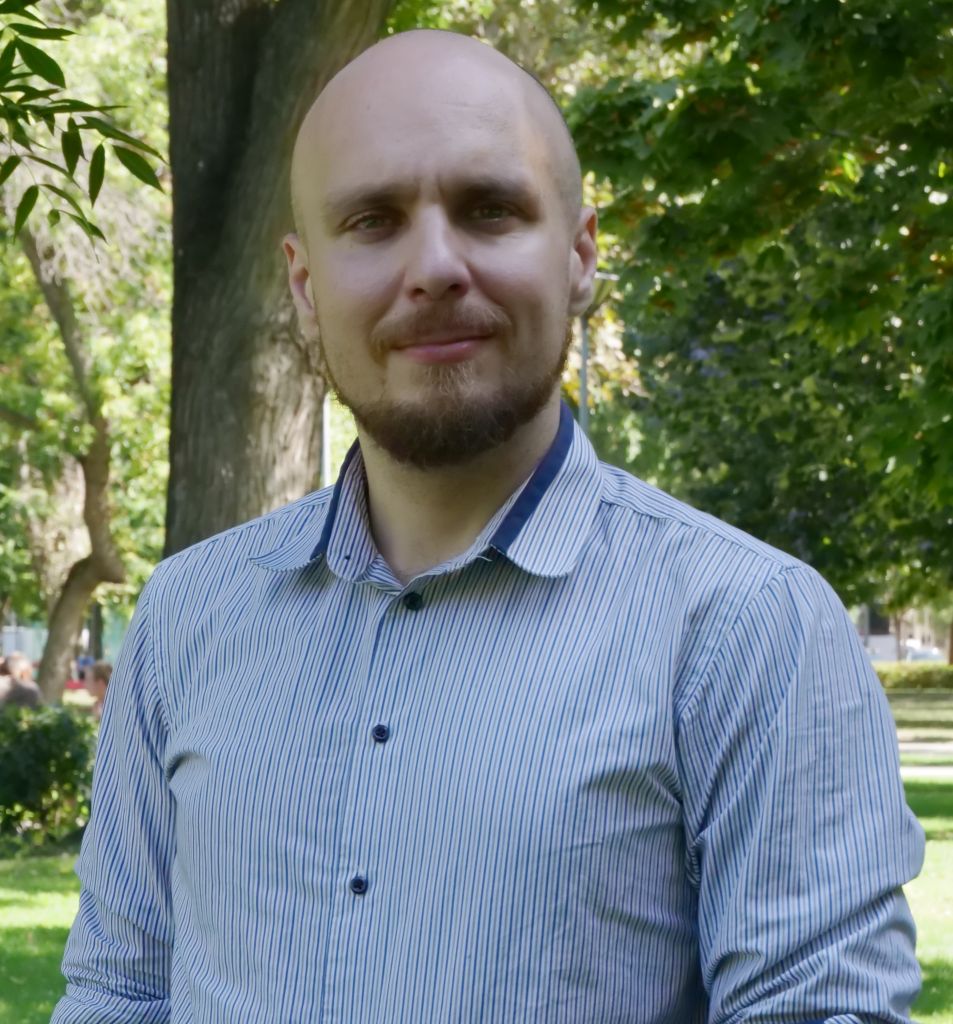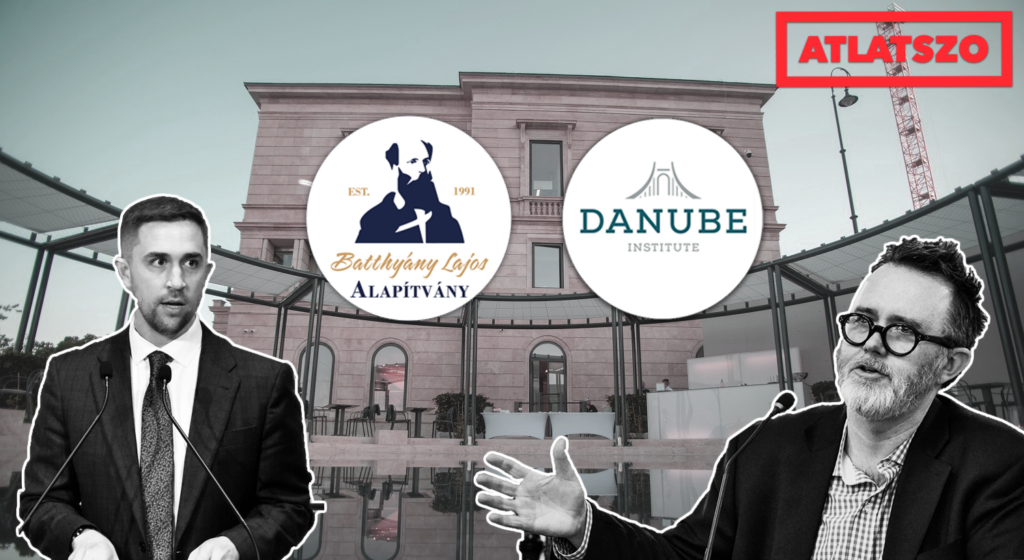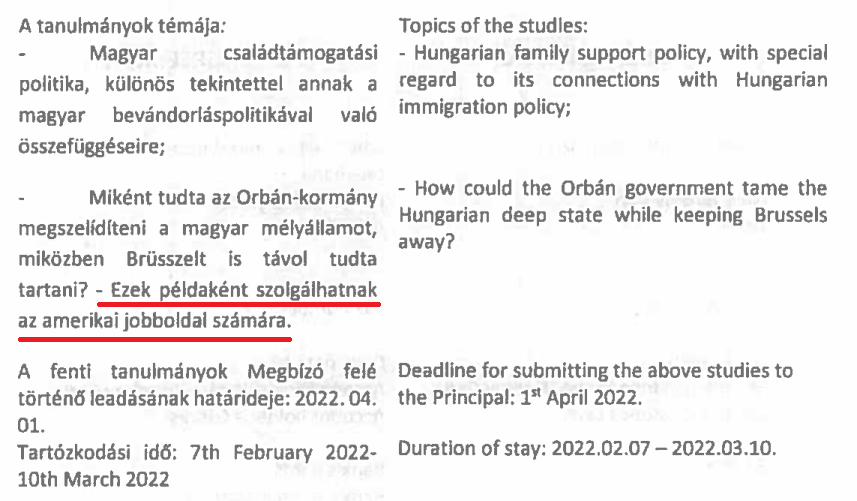The https://english.atlatszo.hu use cookies to track and profile customers such as action tags and pixel tracking on our website to assist our marketing. On our website we use technical, analytical, marketing and preference cookies. These are necessary for our site to work properly and to give us inforamation about how our site is used. See Cookies Policy
Orbanism exported to America through a public interest foundation
While Hungary fears foreign interference and has passed a law to protect its sovereignty, the Orbán government is building a political network in the United States using Hungarian taxpayers’ money. One of the main vehicles for this is the Danube Institute, which has paid millions to American public figures over the past year. Átlátszó obtained some of the contracts of the state-sponsored think-tank, which could be considered as undeclared lobbying, as some of its partners have received money specifically to place articles in the US media that are favourable to the Hungarian government and to present the Orbán government’s actions as a model for the American right.
On 10 December, the Guardian news portal reported that actors linked to the Orbán government (according to the portal, staff of the Hungarian Embassy in Washington and the Institute for Foreign Affairs) were trying to lobby US congressmen on the pretext of a professional event. According to the Guardian, they were trying to persuade politicians from the Republican Party to block the Biden administration’s planned military aid to Ukraine at a two-day conference and a closed meeting. According to the newspaper, the action is not exclusively Hungarian, but is supported by the Heritage Foundation, an important think-tank of the American right.

The incident is the result of a process that has been underway for several years, in which the Hungarian government has been systematically trying to build influence on the American right and shape Washington policy. We have previously reported that the embassy has paid hundreds of millions of Forints to registered US lobbyists over the past few years to build relationships with the US media and politicians, as well as to generate positive media coverage for the Orbán government.
Similar goals emerge when we look at the activities of the Danube Institute, a think-tank based in Hungary but working primarily abroad, which, incidentally, just a few months ago organized a joint geopolitical conference with the Heritage Foundation.
The think-tank, according to its description, was founded “to advocate conservative and national values and thinking”. The Danube Institute is presented in the media as an independent institution even though legally it does not exist. Instead, it is more accurate to call it a project of the Lajos Batthyány Foundation (BLA). Danube Institute or similar is not registered as an NGO or a company, the address given on its website is the same as BLA, and its researchers are contracted to BLA.
The Batthyány Foundation has a long history. It was established in 1991 by Prime Minister József Antall and members of ruling MDF party. Under subsequent governments, it fell into torpor, until in 2018, the Orbán government saw an opportunity in the foundation. That year, the foundation suddenly received HUF 1 billion from the Prime Minister’s Office, lead by Antal Rogán. In 2021, the Batthyány Foundation was elevated to the status of Public Interest Asset Management Trust (KEKVA), albeit it is an atypical one. Unlike other such trusts, BLA is not governed by a government body, but by private individuals.
Nevertheless, in the years following its revival, the Batthyány Foundation has become one of the main sources of public funding for pro-FIDESZ organisations: between 2018 and 2021, it has distributed public funds to organisations such as the Centre for Fundamental Rights or the Self-education Organisation of Law Students.
The BLA also funds events, research and media coverage under the Danube Institute banner. While other BLA publications are mainly used to influence domestic public life, the Danube Institute is one of the main tools of the Orbán government’s ideological expansion abroad, especially in the US.
The main messages of the articles, research and speeches sponsored through the institute is that Hungary is a kind of right-wing utopia and that the policies of the Orbán government can serve as a model for the foreign, especially American, right.
The US Southern Poverty Law Center (SPLC) has obtained the contracts of several of Danube Inistitute’s visiting researchers, which it has shared with Átlátszó. According to the Danube Institute’s website, it has contracted 22 foreign visiting fellows, but few details about most of the researchers’ work are available on the site.
The Danube Inistitute’s contracts, however, show that the visiting researchers’ assignments go beyond academic work, with a significant part of their work being about influencing and networking with the public, particularly the US domestic political public.
US media coverage with Hungarian public money
In April, the SPLC acquired the contract of Rod Dreher, an American journalist living in Hungary and director of the institute’s network project. According to the SPLC, Dreher’s contract would require him to register with the Foreign Agents Registration Act (FARA) database of foreign lobbyists.
As we previously reported, the US FARA database included several US individuals and companies who have received Hungarian public money to promote the Hungarian government in the US. For example, David Reaboi, a lobbyist formerly working in the Trump administration, was also paid by the Hungarian Foreign Ministry to defend the Orbán government from criticism on Twitter. And the Hungarian Embassy in Washington paid a PR firm linked to Tucker Carlson some 56 million forints to arrange positive media coverage of the Orbán government.
Rod Dreher is not listed in the lobbyist database, but according to the SPLC, his activities defined in his contract fall within the definition of unregistered lobbying. Dreher was required to publish about his experiences in Hungary in the US media, for which and other services (participation in Danube Initiative panel discussions, networking with European conservative politicians and public figures) he was granted $8,750 (3, 1 million forints) every month between January 1 and June 30, 2023.
During this period, Dreher reported on an interview with Viktor Orbán for the American Conservative, where he did not disclose that he was receiving money from a Hungarian state-funded institution for his publications.
Journalist Michael O’Shea also received money from the BLA specifically to publish in US media. O’Shea’s links with the Danube Institute date back to 2021, when his work was sponsored via the Hungary Foundation in Washington and Mathias Corvinus Collegium. This year’s contract with BLA stipulates that he has to “write two articles a month, of at least 650 words, especially on Hungarian family policy and Hungarian geopolitics for American and European media”, for which he receives a monthly grant of $4,500 (HUF 1.59 million). During the same period (June 1-December 31), O’Shea also published in the American Conservative, covering, among other things, the Polish elections.
Like Dreher, Christopher F. Rufo also received a large grant from the Danube Institute. A well-known right-wing activist in the US, Rufo has been involved in several Republican-linked think-tanks, including the Heritage Foundation and the Manhattan Institute, and is a trustee of the New College of Florida. He was appointed to the latter in January 2023 by Florida Governor and presidential candidate Ron DeSantis.
Rufo spent six weeks in Hungary in March and April. According to his contract, Rufo received $35,000 (12.41 million forints) from the Batthyány Foundation during the study trip. In exchange, the Hungarian foundation asked him to give two lectures (“on critical race theory and LGBTQ propaganda”) and write two articles, the latter to be published in the Hungarian Conservative or the Hungarian Review.
No articles written by Rufo can be found in those papers, however, Rufo has published a Hungary-related piece in the Compact Magazine: he wrote a detailed, positive article on the policies of the Orbán government, based on the six-week study trip to Hungary organised by the Danube Institute. The message of the article is that the American right would do well to adopt methods from Fidesz. Rufo writes that Orban “has reshaped public and private institutions to create a conservative counter-hegemony. This included schools, universities, NGOs, the media and government. The aim is to strengthen Hungary’s cultural foundations, family life, Christian faith and historical memory.”
As he writes, although the American conservative tradition seeks to weaken the federal government, instead a strong government should be used by Republican politicians to “to advance conservative aims”.
“They can serve as an example for the American right”
The contracts of Jeremy Carl, a journalist who also works for the American Conservative, are also noteworthy. BLA contracted Carl for a $7,000 in February to write two papers, one on Hungarian family policies and the other on “How the Orbán government managed to tame the Hungarian deep state while keeping Brussels out”.
Interestingly, the Hungarian part of the contract (written in two languages) notes that these essays “could serve as an example for the American right”. However, this sentence is missing from the English section. What appears to have happened is the following: BLA sent a photocopy of the contract upon request to the SPLC, and have redacted the sentence from the English section, but forgot to redact it from the Hungarian text, possibly expecting that the American organization would not understand it anyway.
BLA, and through it the Hungarian government’s intention to influence US policy on the Russia-Ukraine war, is evident in two contracts. The war was one of the main topics of a conference (“Danube Geopolitical Summit”) organised in Budapest in September 2023 in cooperation with the Heritage Foundation. Contracts obtained by Átlátszó show that the institute paid a total of $15,000 to two Americans: journalist David Satter and Professor Steven F. Hayward, to attend the conference.
However, Satter expressed views on the issue at the conference that were in stark contrast to those of the Hungarian Government, advocating continued military support for Ukraine and stating that Ukraine giving up occupied territories to Russia would not lead to peace. Some of his statements can be read as explicit criticisms of the Orbán government’s actions:
“I would not recommend any small country, on the one hand, to interfere in any way in the internal politics of the United States with the support of either side, and on the other hand, to undermine the common defense policy.”
Not all of the Danube Institute’s contracts mandate its partners to promote the Hungarian government in the US press. More often they require them to give interviews to the Hungarian press. However, the contracts leave open the possibility of interviews with foreign newspapers, and many contracts stipulate that visiting researchers must assist the Danube Institute’s media appearances in unspecified ways.
Under FARA, accepting funds from a foreign government in exchange for publication in the US media is explicitly considered lobbying, but receiving money for publication in a foreign newspaper is not. Therefore, when Danube Institute partners publish in English-language publications published in Hungary, such as the Hungarian Review or the Hungarian Conservative, the are exempt from FARA registration, even if the content is intended for an American audience.
It is more of a grey area when visiting scholars share their Danube Institute writings and lectures with the US media or on their own channels (as Chris Rufo did, for example, by posting his Budapest talks on his own YouTube account). BLA also pays for its partners to attend external events that reflect Danube Institute values – but we do not know from the contracts for which events the visiting scholars have taken advantage of this opportunity.
However, contracts (Rod Dreher, Michael O’Shea) that commission articles for the US media are clearly fall under FARA.
Written and translated by Zalán Zubor


